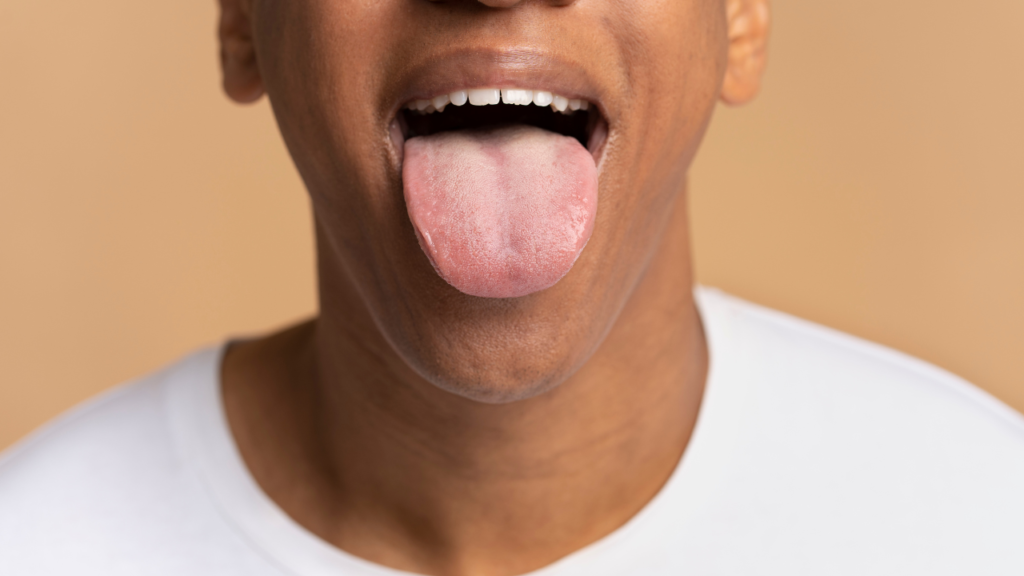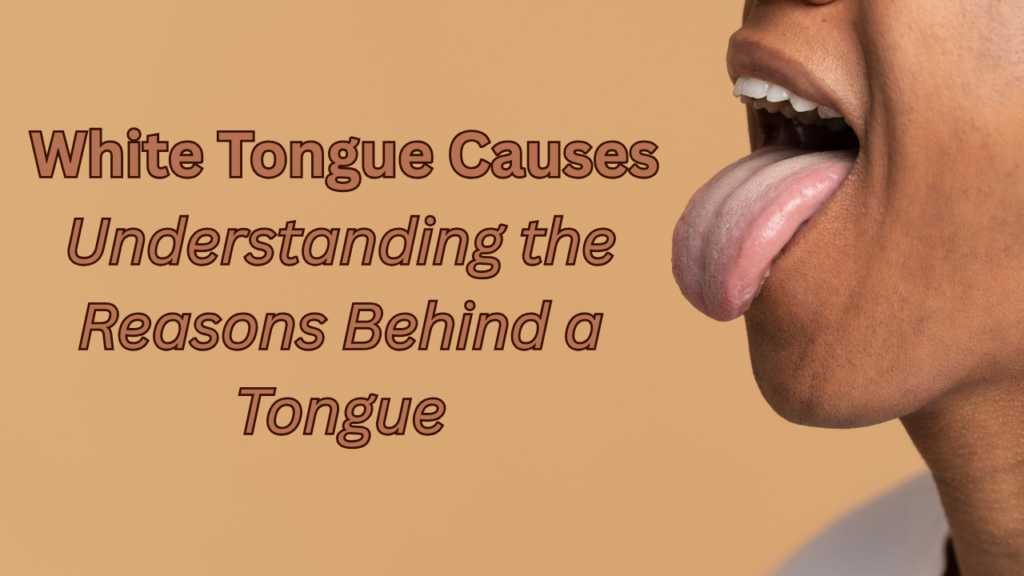A white tongue is a frequently seen condition where the tongue appears faded or covered with a filmy layer. Although it’s generally not serious, recognizing the white tongue causes can help determine if it’s a short-term concern or a symptom of something more serious.
In this comprehensive guide, we’ll explore the various reasons behind a white tongue, associated symptoms, and when to seek medical attention
Table of Contents
ToggleCommon Causes of White Tongue

1. Poor Oral Hygiene
One of the most frequent white tongue causes is inadequate oral hygiene. When bacteria, dead cells, and food debris accumulate on the tongue’s surface, they can form a white coating. Maintaining oral cleanliness by brushing twice daily, flossing, and using a tongue scraper can help avoid buildup on the tongue
2. Oral Thrush (Candidiasis)
Oral thrush is a fungal infection caused by Candida albicans, leading to white patches on the tongue, inner cheeks, and throat. It’s more common in infants, the elderly, and people with weakened immune systems (such as those with diabetes or HIV). Antibiotic use can also trigger thrush by disrupting the balance of oral bacteria.
3. Dehydration and Dry Mouth
A lack of proper hydration can lead to a dry mouth, reducing saliva production. Saliva plays a crucial role in rinsing the mouth, so when its flow is reduced, it can lead to the accumulation of dead cells and microbes, resulting in a whitish layer. Drinking enough water and avoiding excessive caffeine or alcohol can help.
4. Smoking and Tobacco Use
Using tobacco products can irritate the tongue’s surface, leading to discoloration or a coated appearance. Smokers are also at higher risk for leukoplakia, a condition where thick white patches develop on the tongue and gums.
5. Leukoplakia
Leukoplakia is a condition marked by thickened, white areas that form on the tongue or inside the cheeks. Unlike oral thrush, these patches can’t be scraped off. While usually benign, leukoplakia can sometimes be precancerous, especially in smokers. A dentist or doctor should evaluate persistent white patches.
6. Geographic Tongue
Geographic tongue is a benign oral condition characterized by smooth, red patches surrounded by white borders, which shift in shape over time. The cause is unknown, but it may be linked to genetics or vitamin deficiencies. It doesn’t usually require treatment unless discomfort occurs.
7. Bacterial or Viral Infections
Certain infections, such as syphilis or oral lichen planus, can cause white patches or lesions on the tongue. Strep throat and other bacterial infections may also lead to a coated tongue.
8. Mouth Breathing or Sinus Issues
Chronic mouth breathing (due to nasal congestion or sleep apnea) can dry out the tongue, leading to a white coating. Treating underlying sinus or respiratory issues can help restore moisture.
9. Spicy Foods
Excessive alcohol consumption or eating very spicy foods can irritate the tongue, leading to temporary whitening. Reducing intake and rinsing the mouth with water can help.
10. Vitamin Deficiencies
Deficiencies in vitamins B12, iron, or folate can lead to a pale or white tongue. A balanced diet or supplements (if recommended by a doctor) can correct this issue.
When to See a Doctor

While most white tongue causes are harmless, consult a healthcare provider if you experience:
White areas on the tongue that persist despite regular cleaning
Pain, burning, or difficulty swallowing
Bleeding or ulcerations
Signs of infection (fever, swelling)
Prevention and Treatment

Maintain good oral hygiene (brush, floss, and scrape your tongue daily).
Stay hydrated to prevent dry mouth.
Limit smoking and alcohol to reduce irritation.
Incorporate a wholesome diet packed with essential nutrients, vitamins, and minerals to promote healthy gums, teeth, and overall well-being.
Treat underlying conditions (such as thrush or infections) with prescribed medications.
Final Thoughts

In most cases, a white tongue is a brief issue brought on by factors such as inadequate oral care, insufficient hydration, or minor infections. However, if the condition persists or is accompanied by additional symptoms, consulting a healthcare professional is recommended. By understanding the white tongue causes, you can take proactive steps to maintain a healthy mouth and overall well-being.

